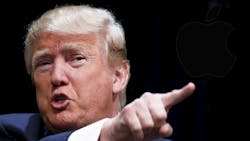Trump Escalates Trade Tensions with Call for New China Tariffs
President Donald Trump ordered his administration to consider imposing tariffs on an additional $100 billion in Chinese imports, a salvo that sent U.S. stock futures tumbling on concern the world’s two largest economies were hurtling toward a full-blown trade war.
The move threatens to unravel efforts by top U.S. and Chinese trade officials to lower the heat and reach an agreement that could stave off an escalating conflict.
U.S. stock futures dropped on Trump’s latest trade directive. S&P 500 Index futures slid as much as 1.6%, after the underlying gauge ended up 0.7% on Thursday.
“In light of China’s unfair retaliation, I have instructed the USTR to consider whether $100 billion of additional tariffs would be appropriate under section 301 and, if so, to identify the products upon which to impose such tariffs,” Trump said in a statement issued by the White House.
A White House official later said the $100 billion figure Trump used in the statement referred to the value of the imports that would be covered by the additional tariffs, not the total amount of tax that would be charged on the products.
Xinhua, China’s state news agency, said Friday that Beijing vowed to defend its interests "against new U.S. actions."
China said Wednesday it would levy a 25% tariff on about $50 billion of U.S. imports including soybeans, automobiles, chemicals and aircraft. That was in response to the release by the U.S. of a list of proposed tariffs a day earlier, covering $50 billion in Chinese products.
No Immediate Effect
U.S. Trade Representative Robert Lighthizer quickly followed up on Trump’s Thursday evening declaration with a statement of his own stressing that none of the tariffs would take immediate effect. The administration hasn’t said when any of the proposed tariffs would go into force.
He said that any additional tariffs first would be subject to a 60-day public comment period, as would the penalties announced earlier in the week.
“No tariffs will go into effect until the respective process is complete,” Lighthizer said.
Trump chief economic adviser Larry Kudlow and other administration officials have spent the past two days trying to tamp down fears of a trade war.
“I think we’re going to come to agreements,” Kudlow said Wednesday on Fox News. “I believe that the Chinese will back down and will play ball.”
Yet Trump signaled a harder line in a speech earlier Thursday, saying it is time to stop China from “taking advantage” of America.
'Fantastic Relationship'
“You have to go after the people who aren’t treating you right,” Trump said in West Virginia. “We’re going to have a fantastic relationship long term with China but we have to get this straightened out, we have to have some balance.”
Kudlow, his newly installed economic adviser, has spent days trying to calm investors who are concerned the spat will spark a trade war, saying on Thursday the administration was involved in “delicate negotiations” that might forestall the need for tariffs. He said the U.S. could still hammer out a deal with Beijing, in part by persuading other major economies to call out the Asian nation for unfair trading practices.
Bloomberg’s Chief Asia Economist Tom Orlik wrote in a note that Trump’s order "raises the possibility of an alarming escalation in the trade conflict between the world’s two biggest economies."
"It’s difficult to tell the difference between a rhetorical flourish from a president known for bombastic remarks and a meaningful shift in policy," Orlik added.
David Loevinger, a former senior Treasury official who is now managing director of emerging markets at TCW Group Inc., said the move casts doubt on the direction of U.S. policy
“It’s just not clear what the connection is right now between what the president says and what will actually become policy,” Loevinger said. “Markets increasingly have to discount White House statements on trade issues.”
China's Counterstrike
China countered Trump’s plan to slap tariffs on 1,333 of the country’s products -- such as semiconductors and lithium batteries -- by announcing duties on a variety of agriculture products, including soybeans, the second-most-valuable U.S. crop.
The U.S. shipped $14.6 billion of soybeans to China, its biggest buyer, in the last marketing year -- more than a third of the entire crop. Agriculture is one of the few sectors of the American economy that runs a trade surplus.
That would hit U.S. farmers hard at a time they are already dealing with depressed crop prices and stagnant values for their land.
Trump said in his statement that he’s directing Agriculture Secretary Sonny Perdue to use his authority to put a plan in place to protect agricultural interests.
Concern about a potential trade war already had been rippling through farm states, which are a crucial part of Trump’s political base and a powerful voting bloc. Trump won eight of the 10 states that are the biggest producers of soybeans.
Farm state Republicans, including Iowa Senators Joni Ernst and Chuck Grassley, and agriculture groups had urged Trump to reconsider his actions on trade.
"There is a real danger that increased tariffs on U.S. exports will harm Iowa producers and undermine the rural economy,” Ernst said in a statement on Wednesday.
Perdue said at an event Wednesday in Ohio that Trump had assured him that the administration would “take care of our American farmers,” possibly foreshadowing Thursday’s announcement.
“He said, ‘Sonny, you can assure your farmers out there that we’re not going to allow them to be the casualties if this trade dispute escalates,” Perdue told reporters, according to a copy of his remarks distributed by the Agriculture Department.
By Toluse Olorunnipa and Andrew Mayeda
About the Author
Bloomberg
Licensed content from Bloomberg, copyright 2016.
